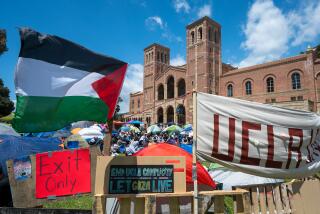Female Voices to Go Unheard at Israeli Site
- Share via
JERUSALEM — Wrapped in a prayer shawl, holding aloft a Torah scroll, Anat Hoffman felt joyous last week as she and a group of Jewish women chanted dawn prayers in a quiet alleyway of Jerusalem’s Old City to welcome in the Hebrew calendar month of Nisan.
Hoffman, an Israeli-born UCLA graduate and a former member of the Jerusalem City Council, later recalled her sense of coming triumph: “I told them all, ‘At the start of next month, we’ll be able to pray like this at the Kotel!’ ” -- the Western Wall, the holiest site in Judaism.
On Sunday, though, the group’s hopes were dashed when Israel’s Supreme Court dealt the women what may have been the final legal rebuff in a 15-year battle to pray aloud, with the same ritual accouterments as men, at the Western Wall, revered by Jews as a remnant of the biblical Second Temple.
In a 5-4 ruling, the high court ordered the state of Israel to provide the women with facilities to pray at a site near -- but not in -- the broad plaza that fronts the towering, ancient yellow stones of the wall. The court-endorsed site for their prayers, known as Robinson’s Arch, lies in a dusty archeological dig just to the south and east of the plaza.
Hoffman, one of the leaders of a group called Women of the Wall -- which began a crusade in 1988 for women to be allowed to read aloud from the Torah and wear tallitot, or prayer shawls, while praying at the wall -- was devastated by the ruling.
It was, she said, an unexpected setback after the court found in the women’s favor nearly three years ago -- a decision that was swiftly appealed by the state and in effect overturned by Sunday’s ruling.
“What a sad, sad day,” Hoffman said. “This sets women apart, treats us as second-class citizens.... I truly wish our court had been more brave.”
Although struggles over sacred ground are a defining characteristic of life in this part of the world, this particular quarrel served as a reminder that some of the bitterest and most passionate religious disputes are waged not between the great faiths but within them.
Women are allowed to pray at the Western Wall, but in a separate section from the men. And they are expected to pray silently or inaudibly, lest the sound of their voices prove a lewd distraction to male worshipers nearby.
Over the years, efforts to change the status quo led not only to legal battles but also to ugly confrontations in the shadow of the wall. Women who prayed aloud together faced a barrage of catcalls from fellow worshipers, and sometimes a hail of hurled objects. Perhaps with such scenes in mind, the court accepted the government’s argument that the women’s prayers posed a threat to public safety.
The women had sought the right to pray aloud for only an hour on the first day of each new month of the Hebrew calendar, and on the Jewish New Year. But tradition-minded Jews -- including the rabbi who oversees the wall, which is considered an open-air synagogue -- defended the requirement that female worshipers’ activities strictly conform to Halakha, or Jewish law, at all times.
“Any woman can come to pray,” Rabbi Shmuel Rabinovich told Israel Radio after the court ruling. “And I urge them to come and pray -- according to Jewish tradition. The wall is open to every religious and nonreligious Jew who prays according to Jewish tradition.”
Although it is a deeply important religious landmark, the wall has never been the sole province of observant Jews. It is a national icon; almost every Israeli child has studied schoolbook photographs of the battle-hardened, tear-stained Israeli paratroopers who captured the wall, along with the rest of the Old City, East Jerusalem and the West Bank, from Jordan in the 1967 Middle East War.
Israeli adults old enough to recall that time invariably remember where they were and what they were doing when the electrifying word came crackling over field radios, swiftly relayed to all the country: “The Kotel is in our hands!”
So enshrined is the wall’s place in Israeli culture that the often-recalcitrant state telephone company, Bezeq, readily accepts faxed messages to be placed, as prayers have been for thousands of years, in the cracks between the stones.
In its ruling Sunday, the high court left open a possible avenue of appeal for the women, saying they can again seek permission to pray aloud in the plaza if the government has not prepared the Robinson’s Arch site within a year. But it did not specify what those preparations should entail.
“My daughter, who is 16 now, was a baby when we began all this,” Hoffman said. “I had hoped we would prevail in time for her bat mitzvah, when she was 13, but that did not happen.... Maybe if I have a granddaughter, she will be able to pray as she wishes.”
More to Read
Sign up for Essential California
The most important California stories and recommendations in your inbox every morning.
You may occasionally receive promotional content from the Los Angeles Times.













